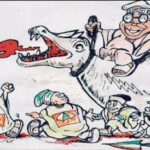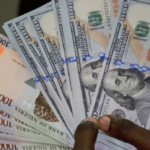ON my mind today is the free-fall, nay crash, of the Naira against major global currencies, especially the US Dollar, which to all intents and practices, is the transactional currency of preference, especially in political circles.
When President Bola Tinubu assumed office, he announced two major policy decisions — removal of subsidy on petrol, and the elimination of multiple foreign exchange windows. We have all seen the effect of the two policies on our abilities to put food on the table. To say the least, our individual capacities to pursue happiness as we see fit have been severely limited by the effect of the policies as prices of foodstuffs and other items we use daily skyrocketed out of reach.
They not just hit the ceiling, they burst through the roof, into the sky and headed for outer space. By year end, I see many fellow country men and women just gnashing their teeth at unfulfilled dreams as their abilities to “make things happen” for their families get more and more limited. Things, in a nutshell, are really “very hard”. Decode that.
But how did we get here? In the first instance, we sustained severe self-immolation and concomitant damage with the election of Muhammadu Buhari in 2015. Between 2015 and 2023 when he left, everything about our national life had gone south under his unique type of leadership, while his cohorts continue to shout from the roof tops that the man was a beacon of integrity and the best thing to happen to Nigeria since amalgamation in 1914.
During Buhari’s eight years, nobody in his administration thought of what to do as many factories that produced what we now import folded up, one after the other. Major tyre makers, Dunlop folded up; Michelin followed suit. Before they died, battery manufacturers like Exide Batteries in Ibadan, and Berec in Kaduna became clients of the mortician. Oluwa Glass, Isoglass, Adebowale Electrical and many more had also packed up.
Of course, Volkswagen of Nigeria, ANAMMCO, Steyr, PAN Nigeria and other automakers had ceased production. What of the textile sector that employed thousands of workers? One after the other, they choked to death due to policy inconsistencies which affected the cost of their inputs. Afprint, Churchgate, Varaman, KTL, Nichemtex, and many more went under. The industrial estates of Ikeja, Isolo and in Kano, Port Harcourt, Sapele, Benin all became ghost areas.
Where are the manufacturing companies that once made up the conglomerate called UAC? I remember that at one time, when the Federal Government released its budget for the next year, reviews would not be complete without major pronouncements from the UAC chairman. Now almost all the companies that make up that one-famous conglomerate have died.
While all these companies were dying, we had presidents who appointed ministers of industries who simply sat in their air-conditioned offices and rode around town in their intimidating SUVs, and did nothing to address the causes of factory closure.
Sadly, these negative trends have continued with the recent announcement that GlazoSmithlkine, or GSK, a major pharmaceutical concern that had operated in the country for decades, was shutting down operations here. With that, we would even have to start importing cough syrups and other OTCs like panadol. And we would complain of the fall in the value of the Naira.
How will the Naira be strong when killing local production has become a specialty? Will Tinubu’s minister of industries wake up to this challenge? I think the best approach to help the new CBN governor, Olayemi Cardoso, succeed with exchange rate management is to immediately see how many of our dead industries can be revived under an emergency plan.
It is imperative that all the industries mentioned above and others not mentioned be assisted to resurrect. This will have the effect of boosting employment, while we will no longer have to import foreign substitutes of their products. In other words, we wouldn’t have to pack all the Naira available in here to purchase dollars for imports.
To save our country, and make life and living easier for the peoples of this great country is a task that must be done, but will need a lot of rigour; hard, gruelling work. All those flowing agbadas should be left in the wardrobes. There is a lot of work to be done. It is hard, no doubt, but it can be done. If we get on to it, we would be solving a lot of problems along the way, like insecurity and youth unemployment.
Apart from that, it is the surest way to attract foreign investors. It is empty talk to travel out to a foreign country and urge their men and women of means to come and invest here when we cannot guarantee continued life for existing investments, all of which are currently threatened by the very harsh operating environment. It will be a nice thing if President Tinubu take cogent steps to revive our dead industrial concerns.
The post Need to revive dead industries to save Nigeria appeared first on Vanguard News.





